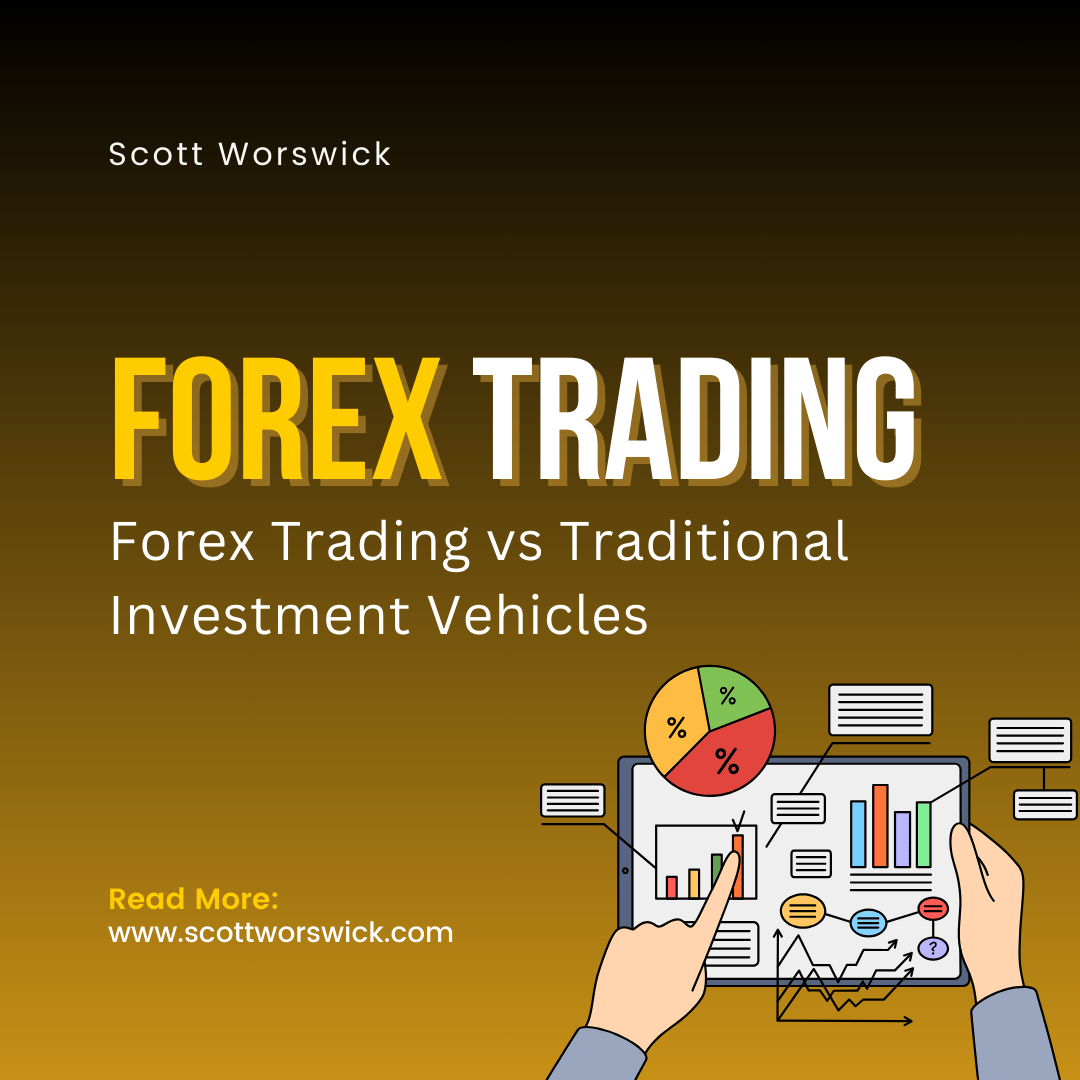Investing is a fundamental aspect of financial planning, shaping the way individuals and institutions build wealth and secure their financial future. With a plethora of investment vehicles available today, choosing the right option can be daunting. Among the myriad of choices, forex trading and traditional investment vehicles like stocks, bonds, mutual funds, and real estate stand out due to their popularity and distinct characteristics. This comparative analysis aims to shed light on the key differences between these two investment approaches, helping investors make informed decisions based on their financial goals, risk tolerance, and market knowledge.
Forex trading, the practice of buying and selling currencies to profit from exchange rate fluctuations, has gained immense popularity over the past few decades. Its appeal lies in the market’s unparalleled liquidity, the potential for high returns through leverage, and the convenience of online trading platforms. Unlike traditional investment vehicles, which often require substantial capital and longer time horizons, forex trading is accessible to a broader audience, allowing even those with modest funds to participate. However, the high volatility and complexity of the forex market present significant challenges that require a deep understanding of market dynamics and robust risk management strategies.
On the other hand, traditional investment vehicles have been the cornerstone of investment portfolios for generations. Stocks offer ownership stakes in companies, providing opportunities for capital appreciation and dividend income. Bonds offer more stability, delivering regular interest payments and lower risk compared to equities. Mutual funds provide diversification and professional management, while real estate investments offer tangible assets and rental income potential. These traditional options are often perceived as safer and more stable compared to forex trading, making them attractive to conservative investors. By comparing forex trading and traditional investment vehicles, this analysis will highlight their unique advantages and risks, guiding investors towards the most suitable choice for their financial aspirations.
Table of Contents
Understanding Forex Trading

Forex trading, or foreign exchange trading, involves the buying and selling of currencies on the global market to capitalize on fluctuations in exchange rates. This market is the largest and most liquid in the world, with a daily trading volume exceeding $6 trillion. Participants range from individual retail traders to large financial institutions, all engaging in transactions 24 hours a day, five days a week. The primary goal in forex trading is to predict currency movements accurately and profit from the relative changes in value between currency pairs, such as the EUR/USD or GBP/JPY.
The allure of forex trading lies in its potential for high returns, amplified by leverage, which allows traders to control large positions with a fraction of the capital. However, this leverage also increases the risk of significant losses. Success in forex trading demands a comprehensive understanding of global economic indicators, geopolitical events, and technical analysis tools. Despite its complexity, forex trading remains accessible to a wide audience due to the proliferation of online platforms and educational resources, making it an enticing option for both novice and experienced investors.
Advantages of Forex Trading:
1. Liquidity:
Liquidity refers to the ease with which an asset can be quickly bought or sold in the market without affecting its price. In the context of investments, liquidity is a crucial factor, especially for those who may need to access their funds on short notice. The forex market is renowned for its unparalleled liquidity, being the largest and most active financial market globally with over $6 trillion traded daily. This immense volume ensures that traders can enter and exit positions swiftly and efficiently, often with minimal slippage.
This high liquidity in forex trading contrasts sharply with traditional investment vehicles like real estate, which can take weeks or even months to sell. Stocks and bonds, while generally more liquid than real estate, still face potential liquidity constraints during periods of market stress or economic downturns. The robust liquidity of the forex market not only facilitates smoother transactions but also provides a level of stability, allowing traders to capitalize on opportunities in real time. This aspect makes forex trading particularly attractive to those who value the ability to react promptly to market changes and seek immediate access to their investments.
2. Leverage:
Leverage is a powerful tool in the realm of forex trading, allowing traders to control large positions with a relatively small amount of capital. This means that with leverage, even minor movements in currency prices can lead to significant gains. For example, with a leverage ratio of 100:1, a trader can control a $100,000 position with just $1,000 of their own money. This amplification of buying power can potentially yield substantial profits, making forex trading highly attractive to those looking to maximize returns on their investments. However, leverage is a double-edged sword, as it also magnifies losses.
A small adverse movement in the market can quickly deplete the trader’s capital if not managed properly. This high-risk, high-reward dynamic requires traders to employ stringent risk management strategies and maintain a deep understanding of market behavior. In contrast, traditional investment vehicles like stocks, bonds, and mutual funds generally do not offer such high levels of leverage, making them less risky but also potentially less profitable in the short term. Understanding how to use leverage effectively is crucial for anyone looking to succeed in forex trading, balancing the potential for high returns with the need for disciplined risk management.
3. Accessibility:
Accessibility is a key factor that distinguishes forex trading from traditional investment vehicles. Forex trading has become increasingly accessible to a global audience, thanks to the proliferation of online trading platforms and the relatively low barriers to entry. Individuals can start trading with modest capital, often as low as a few hundred dollars, and benefit from comprehensive educational resources available online. This democratization of trading allows more people to participate in the forex market, regardless of their financial background or geographic location. In contrast, traditional investment vehicles like stocks, bonds, and real estate often require more substantial initial investments and are subject to regulatory and administrative hurdles that can complicate the process for new investors.
Additionally, these traditional investments may involve broker fees, minimum investment requirements, and other costs that can deter smaller investors. The round-the-clock nature of the forex market also enhances its accessibility, enabling traders to respond to market movements at any time of day. This level of accessibility makes forex trading an appealing option for those seeking flexibility and immediate involvement in the global financial markets.
Risks of Forex Trading:
1. High Volatility:
High volatility is a defining characteristic of forex trading, where currency prices can fluctuate dramatically within short time frames due to various factors such as economic data releases, geopolitical events, and market sentiment. This volatility presents both opportunities and risks for traders. On one hand, the rapid price movements can lead to substantial profits, particularly for those employing short-term trading strategies and leveraging technical analysis. On the other hand, high volatility can result in significant losses if market trends move unfavorably against a trader’s position.
This dynamic environment requires forex traders to remain vigilant and adaptable, often employing advanced risk management techniques such as stop-loss orders and hedging to mitigate potential downsides. In contrast, traditional investment vehicles like stocks and bonds typically exhibit lower volatility, offering more stability but also potentially lower returns over short periods. While high volatility can be daunting, it also provides the excitement and potential for quick gains that many traders seek in the forex market. Understanding and managing this volatility is crucial for anyone looking to navigate the fast-paced world of forex trading successfully.
2. Leverage Risks:
Leverage, while offering the potential for amplified profits, also introduces significant risks in forex trading. The ability to control large positions with a relatively small amount of capital means that even slight market fluctuations can lead to substantial financial losses. For instance, a leverage ratio of 100:1 magnifies both gains and losses by the same factor, which can quickly erode a trader’s capital if the market moves against their position. This heightened risk requires forex traders to have a robust understanding of market dynamics and implement rigorous risk management strategies, such as setting stop-loss orders to limit potential losses.
In contrast, traditional investment vehicles like stocks and bonds generally do not offer such high levels of leverage, resulting in a more stable but potentially less lucrative investment landscape. The risks associated with leverage in forex trading underscore the importance of prudent trading practices and the necessity for traders to maintain a disciplined approach, balancing the pursuit of high returns with the need to protect their capital. Understanding the leverage risks is crucial for anyone looking to engage in forex trading and navigate its inherently volatile environment.
3. Complexity:
The complexity of forex trading sets it apart from traditional investment vehicles, demanding a deep and nuanced understanding of various factors influencing currency markets. Successful forex trading requires expertise in technical analysis, which involves interpreting complex charts and indicators to predict future price movements. Traders must also stay abreast of global economic news, geopolitical developments, and central bank policies, all of which can cause rapid and unpredictable shifts in currency values.
This multifaceted nature makes forex trading inherently more complex compared to traditional investments like stocks and bonds, where factors influencing price movements are generally more straightforward and less interconnected. Furthermore, the use of leverage in forex trading adds another layer of complexity, necessitating advanced risk management techniques to avoid substantial losses. In contrast, traditional investment vehicles are often perceived as more accessible and easier to manage, particularly for novice investors. Understanding the intricacies and demands of forex trading is crucial for anyone looking to navigate its challenging landscape and maximize potential returns while mitigating risks.
Traditional Investment Vehicles

Traditional investment vehicles, including stocks, bonds, mutual funds, and real estate, have long been the cornerstone of personal and institutional investment portfolios. These assets are generally well-understood, widely accessible, and often considered safer compared to the highly volatile forex trading market. Stocks offer ownership stakes in companies, providing opportunities for capital appreciation and dividend income, while bonds are known for their stability and predictable interest payments. Mutual funds pool resources from multiple investors to invest in diversified portfolios, managed by professional fund managers, thus spreading risk across various asset classes.
Real estate investments, though requiring substantial initial capital, offer tangible assets and potential rental income, along with long-term appreciation. Unlike the rapid, minute-to-minute changes seen in forex trading, traditional investments typically involve a longer-term perspective, focusing on steady growth and income over time. These vehicles are subject to different regulatory frameworks, providing a level of protection and predictability that appeals to conservative investors. Overall, traditional investment vehicles offer a balanced approach to wealth building, catering to those who prioritize stability and gradual wealth accumulation.
1. Stocks:
Stocks represent a share of ownership in a company, allowing investors to participate in the company’s financial success through capital appreciation and dividends. Investing in stocks can offer substantial returns, particularly when investing in high-growth companies or those that pay consistent dividends. Stocks are traded on various exchanges, providing liquidity and the ability to quickly buy or sell shares. This accessibility makes them a popular choice for investors seeking both short-term gains and long-term growth.
Unlike forex trading, where currency pairs fluctuate rapidly, stock investments often involve a longer-term outlook, focusing on the overall health and performance of the company and the broader market. The value of stocks can be influenced by company earnings, economic conditions, and industry trends, but generally, they offer a more straightforward investment approach compared to the complexities of forex trading. For many investors, stocks provide a balanced combination of risk and reward, making them an essential component of a diversified investment portfolio.
Advantages:
Stocks offer several compelling advantages that make them a favored choice for investors. One of the primary benefits is the potential for substantial capital appreciation, as stock prices can rise significantly if a company performs well. Additionally, many stocks pay dividends, providing a steady stream of income and an opportunity to earn returns even when prices are flat. Stocks also grant shareholders voting rights and a say in major company decisions, adding a layer of engagement and ownership that is not present in forex trading.
The stock market is highly liquid, with numerous exchanges facilitating the easy buying and selling of shares. Furthermore, investing in stocks allows for diversification across various sectors and industries, which can help spread risk and enhance overall portfolio performance. Unlike the often high-risk, short-term nature of forex trading, stocks typically offer a more stable and predictable investment approach, suitable for both long-term growth and income generation. These advantages make stocks a valuable component of any investment strategy, appealing to both novice and seasoned investors.
Risks:
Despite their advantages, stocks come with their own set of risks that investors must navigate. Market volatility can cause stock prices to fluctuate significantly due to factors such as economic downturns, geopolitical events, or company-specific issues. This volatility can lead to substantial losses if an investor is not prepared for sudden market swings. Additionally, individual stocks are subject to business risk, which includes factors like management decisions, financial health, and competitive pressures.
Poor performance or negative news about a company can severely impact its stock price. Unlike the more immediate, high-risk environment of forex trading, stock investments typically require a longer-term perspective to manage and mitigate these risks effectively. Investors must also be wary of systemic risks affecting the entire market, such as economic recessions or financial crises, which can lead to widespread declines in stock values. Therefore, while stocks offer growth and income potential, they also demand careful research, diversification, and risk management strategies to protect against potential losses.
2. Bonds:
Bonds are a form of fixed-income investment where investors lend money to governments or corporations in exchange for periodic interest payments and the return of the principal amount at maturity. This investment vehicle is known for its stability and predictability, making it an attractive option for those seeking steady income and lower risk compared to forex trading. Bonds are generally less volatile than stocks, as their value is less susceptible to market fluctuations and more tied to interest rates and credit risk.
Investors receive regular interest payments, often referred to as coupon payments, providing a reliable income stream. Additionally, bonds can be an effective tool for portfolio diversification, balancing higher-risk assets like stocks and forex with more stable, income-generating investments. The risk associated with bonds primarily involves interest rate risk—where rising rates can decrease bond prices—and credit risk, which pertains to the issuer’s ability to make payments. Overall, bonds offer a conservative investment approach, appealing to those who prioritize capital preservation and consistent returns over the high-risk, high-reward nature of forex trading.
Advantages:
Bonds offer several notable advantages that make them a preferred choice for risk-averse investors seeking stability and consistent income. One of the key benefits is the predictable income stream provided by regular interest payments, known as coupon payments, which can be a reliable source of revenue, especially for retirees or those looking for steady cash flow. Additionally, bonds are generally less volatile compared to stocks and forex trading, offering a more stable investment experience with lower price fluctuations.
The return of the principal amount at maturity further enhances their appeal, as it ensures investors receive their original investment back, provided the issuer does not default. Bonds also offer a variety of options to suit different investment goals and risk tolerances, from government bonds with low credit risk to corporate bonds with potentially higher yields. The relatively conservative nature of bonds makes them an excellent tool for portfolio diversification, helping to balance higher-risk assets and mitigate overall investment risk. These advantages make bonds a compelling choice for those prioritizing safety and predictable returns in their investment strategy.
Risks:
While bonds are often valued for their stability and consistent income, they are not without risks. Interest rate risk is a significant concern, as bond prices tend to fall when interest rates rise, potentially leading to capital losses if the bonds are sold before maturity. Additionally, credit risk poses a threat if the issuer of the bond faces financial difficulties, potentially leading to default and loss of principal. Inflation risk also affects bonds, as rising inflation can erode the purchasing power of the fixed interest payments, reducing the real value of returns.
Unlike the high volatility and rapid fluctuations in forex trading, these risks in bonds tend to manifest over longer periods, making them less immediate but still crucial to consider. Investors must carefully assess the creditworthiness of issuers and the impact of economic conditions on interest rates to mitigate these risks effectively. Overall, while bonds offer stability, understanding and managing these risks is essential to ensure they align with one’s investment objectives and risk tolerance.
3. Mutual Funds:
Mutual funds are investment vehicles that pool money from numerous investors to create a diversified portfolio of stocks, bonds, or other securities, managed by professional fund managers. This collective investment approach offers several benefits, including diversification, which helps spread risk across various assets and reduces the impact of poor performance from any single investment. Mutual funds provide investors with professional management, saving them the time and expertise required to select individual securities.
This is particularly advantageous for those who prefer a hands-off approach or lack the time to manage investments actively. Additionally, mutual funds offer varying levels of risk and return to suit different investment goals, from conservative bond funds to aggressive equity funds. Unlike the fast-paced, high-risk environment of forex trading, mutual funds typically offer a more stable investment experience with a focus on long-term growth and income. However, investors should be aware of management fees and potential fund-specific risks, such as those associated with the underlying assets. Overall, mutual funds provide a convenient and diversified investment option for both novice and experienced investors.
Advantages:
Mutual funds offer a range of advantages that make them a popular choice for investors seeking a balanced and managed investment approach. One of the primary benefits is diversification, as mutual funds pool investments from numerous individuals to create a broad portfolio of assets, which helps spread risk and reduce the impact of any single investment’s poor performance. This built-in diversification is particularly valuable for investors looking to minimize risk without having to select and manage individual securities themselves. Additionally, mutual funds are managed by professional fund managers who have expertise and resources to analyze market trends, select investments, and make strategic decisions on behalf of investors.
This professional management can be especially advantageous for those who lack the time or knowledge to manage their investments actively. Mutual funds also offer liquidity, allowing investors to buy or sell shares at the end of each trading day at the fund’s net asset value (NAV). Unlike the fast-paced and high-risk nature of forex trading, mutual funds typically focus on long-term growth and stability, making them a suitable option for a wide range of investment goals. However, investors should be aware of management fees and the specific risks associated with the underlying assets in the fund. Overall, the advantages of mutual funds include ease of access, professional management, and diversified risk, making them a valuable component of many investment portfolios.
Risks:
Despite their many advantages, mutual funds come with inherent risks that investors need to consider. One significant risk is market risk, as the performance of a mutual fund is directly tied to the performance of the underlying securities, which can fluctuate due to market conditions. This means that if the stock or bond markets decline, the value of the mutual fund can also drop. Additionally, mutual funds are subject to management risk, where the fund’s performance heavily depends on the decisions made by the fund manager.
Poor management or strategic missteps can lead to suboptimal returns. Another risk is the potential for fees to eat into returns; mutual funds often charge management fees, and some also have front-end or back-end loads, which can reduce overall investment gains. Unlike the high volatility and immediate risks associated with forex trading, these risks in mutual funds tend to manifest over time and can be mitigated through careful fund selection and diversification within the fund’s holdings. It’s essential for investors to thoroughly research and understand the specific risks associated with a mutual fund before investing, ensuring that the fund aligns with their financial goals and risk tolerance.
4. Real Estate:
Real estate involves investing in physical properties, such as residential, commercial, or industrial buildings, with the aim of generating rental income or capital appreciation. This traditional investment vehicle offers several compelling benefits, including the potential for steady cash flow through rental income and the opportunity for long-term value growth as property values appreciate. Real estate also provides a tangible asset, which many investors find reassuring compared to the abstract nature of forex trading. Additionally, real estate can offer tax advantages, such as deductions for mortgage interest, property taxes, and depreciation. Unlike the highly liquid and rapidly changing forex market, real estate investments typically involve a longer-term commitment and require active management or involvement in property maintenance and tenant relations.
However, real estate can also present challenges such as illiquidity, where selling a property may take time, and significant upfront capital requirements for purchase and maintenance. Despite these challenges, the potential for stable income and asset appreciation makes real estate a valuable component of a diversified investment portfolio.
Advantages:
Real estate offers several distinct advantages that make it an attractive investment option compared to forex trading and other investment vehicles. One of the primary benefits is the potential for stable and predictable income through rental payments, which can provide a reliable cash flow for investors. Additionally, real estate properties often appreciate over time, offering the potential for long-term capital gains as property values increase. Investing in real estate also allows for tangible asset ownership, which many investors find more reassuring than intangible assets like currencies.
Real estate investments can also provide diversification benefits, as they are less correlated with the stock and forex markets, thus helping to reduce overall portfolio risk. Moreover, property owners can benefit from tax advantages, including deductions for mortgage interest, property taxes, and depreciation, which can enhance overall returns. Real estate also provides opportunities for leveraging, where investors can use borrowed funds to increase their investment potential. These advantages make real estate a compelling choice for those seeking both income and growth, and who are willing to engage in a more hands-on investment approach compared to the high-speed and volatile nature of forex trading.
Risks:
Investing in real estate, while potentially lucrative, comes with its own set of risks that investors must carefully consider. One major risk is illiquidity, as selling a property can be a lengthy process, sometimes taking months or even years to complete. This lack of liquidity can be problematic if quick access to cash is needed. Additionally, real estate investments are subject to market risk; property values can fluctuate due to economic downturns, changes in interest rates, or shifts in local market conditions. Maintenance and management of properties also involve ongoing costs and responsibilities, including repairs, property taxes, and tenant issues, which can impact overall profitability.
Unlike the fast-paced and highly volatile environment of forex trading, these risks tend to evolve over a longer time horizon, but they are nonetheless significant. Moreover, real estate investments are often capital-intensive, requiring substantial upfront investment and potentially increasing exposure to financial risk if property values decline. Overall, while real estate offers numerous advantages, understanding and managing these risks is crucial for investors looking to achieve a balanced and successful investment strategy.
Conclusion
In comparing forex trading with traditional investment vehicles such as stocks, bonds, mutual funds, and real estate, it becomes evident that each approach offers unique benefits and challenges tailored to different investor needs and goals. It stands out for its unparalleled liquidity, high leverage, and round-the-clock market access, making it an appealing option for those seeking rapid, short-term gains and the flexibility to trade at any time. However, the high volatility and complexity of the forex market require a robust understanding of market dynamics and diligent risk management strategies to navigate successfully.
On the other hand, traditional investment vehicles like stocks, bonds, mutual funds, and real estate provide a range of benefits from stability and professional management to tangible asset ownership and potential for steady income. These investments often align better with long-term financial goals and offer a more predictable return profile compared to the fast-paced, high-risk environment of forex trading. Each investment type brings its own set of risks and rewards, and the choice between them should be guided by individual financial objectives, risk tolerance, and investment horizon. Ultimately, a diversified approach that includes a mix of traditional investments and, if suitable, forex trading may provide a balanced strategy to achieve a range of financial goals.




